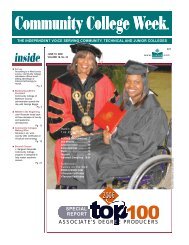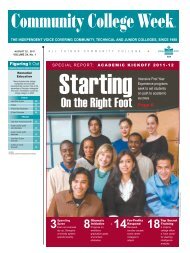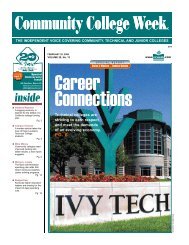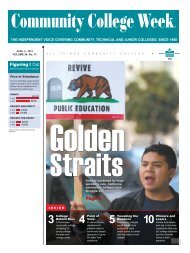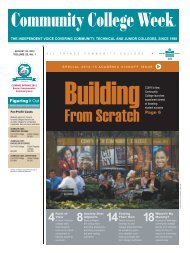Download - Community College Week
Download - Community College Week
Download - Community College Week
You also want an ePaper? Increase the reach of your titles
YUMPU automatically turns print PDFs into web optimized ePapers that Google loves.
www.ccweek.com March 22, 2010 15<br />
tracking trends<br />
Submitting<br />
articles to<br />
<strong>Community</strong><br />
<strong>College</strong> <strong>Week</strong><br />
grants&gifts<br />
Submissions should be<br />
brief and include:<br />
Dollar amount (or itemization of inkind<br />
contributions)<br />
of the grant or gift<br />
Who/what is giving or granting<br />
What the gift or grant will be used<br />
for.<br />
Please send information to<br />
editor@ccweek.com with<br />
“Grants and Gifts” as the<br />
subject line.<br />
Appointments<br />
Submissions should be brief and include<br />
the following information about the<br />
individual:<br />
Name<br />
Description of new position<br />
His or her most recent job (before<br />
taking new position)<br />
Educational background, including<br />
degrees earned and institutions from<br />
which they were earned. Please<br />
send information to <strong>Community</strong> <strong>College</strong><br />
<strong>Week</strong> using the following e-mail<br />
address: editor@ccweek.com<br />
Despite Tenn. Law, Transferring<br />
<strong>College</strong> Credits Remains Difficult<br />
CH ATTANOOGA,<br />
Tenn. (AP) — A higher<br />
education overhaul<br />
that passed overwhelmingly<br />
last month promised to make it<br />
easier for students to transfer<br />
from two-year colleges to<br />
four-year universities. But<br />
educators are finding that it’s<br />
difficult to move students from<br />
one school to the other without<br />
losing some credits, according<br />
to the Chattanooga Times Free<br />
Press.<br />
Educators are now in the<br />
process of finding a way to<br />
comply with a new law that<br />
allows students with two-year<br />
associate degrees to transfer to<br />
universities as junior. They’re<br />
focused on hammering out a<br />
core set of pre-major requirements<br />
that can transfer easily.<br />
But many tenured professors<br />
at universities still have<br />
the final say about whether a<br />
credit from a community college<br />
will be accepted into the<br />
new school.<br />
One of those professors is<br />
Matt Greenwell, head of the art<br />
department at University of<br />
Tennessee at Chattanooga.<br />
Greenwell says that in the<br />
past he’s resisted pressure to<br />
admit community college students<br />
into UTC’s art program<br />
unless they retake some classes,<br />
and that won’t change<br />
despite the new law.<br />
“Our concern is not about<br />
quality. It’s about the nature of<br />
the content and how it feeds<br />
into our level of coursework,”<br />
Greenwell told the Chattanooga<br />
paper.<br />
The professor insisted that<br />
he was in no way being elitist<br />
toward community college students.<br />
<strong>Community</strong> college leaders<br />
say Greenwell’s position is<br />
fairly common among university<br />
professors, who still get to<br />
decide what counts as credit<br />
and what doesn’t — despite<br />
years-old transfer agreements<br />
signed between two-year and<br />
four-year colleges.<br />
The practice, some say,<br />
comes at a price.<br />
“This has cost the taxpayers<br />
of the state of Tennessee an<br />
enormous amount of money,”<br />
said Chattanooga State <strong>Community</strong><br />
<strong>College</strong> President Jim<br />
Catanzaro. “It has delayed and<br />
impeded graduation, and it<br />
doesn’t make sense.”<br />
The Tennessee Higher Education<br />
Commission found that<br />
transfer students must take an<br />
additional 20 hours of credit<br />
work to graduate from almost<br />
all universities.<br />
State lawmakers, in a special<br />
session last month, tried to<br />
treat the problem by setting a<br />
statewide 41-hour general education<br />
core of pre-major<br />
requirements.<br />
Educators, in an effort to<br />
comply with the new law, have<br />
come to a consensus on a block<br />
of general education courses<br />
that will easily transfer.<br />
But they’re still trying to<br />
find agreement on what courses<br />
should be required for individual<br />
areas of study.<br />
Comments: editor@ccweek.com<br />
Dallas TeLeLearning<br />
DIGITAL RESOURCE REPOSITORY<br />
This vast library of video and media-rich interactive exercises features:<br />
. More than 2500 video clips and exercises/activities across<br />
multiple disciplines<br />
. Content to use in your online, hybrid and face-to-face courses<br />
. Seamless integration into Learning Management Systems<br />
. A catalog interface with powerful<br />
browse and search<br />
. Annual subscription-based<br />
digital content<br />
“Having the ability to grow the<br />
repository by adding content, as well as<br />
having diversity in the choice of learning<br />
objects available is a big plus.”<br />
-- Bryan Maertins<br />
Texas State Technical <strong>College</strong><br />
telelearning.dcccd.edu 866.DISTLRN 866.347.8576<br />
Pick a subject. . .<br />
Any subject. . .<br />
.<br />
Accounting<br />
Anatomy &<br />
Physiology<br />
.<br />
Business<br />
Economics<br />
English<br />
Government<br />
Health<br />
History<br />
Nutrition<br />
.<br />
Physical Education<br />
Sociology<br />
Coming Soon:<br />
Geology & Spanish<br />
Be our guest:<br />
email tlearn@dcccd.edu<br />
to browse and<br />
preview content.




